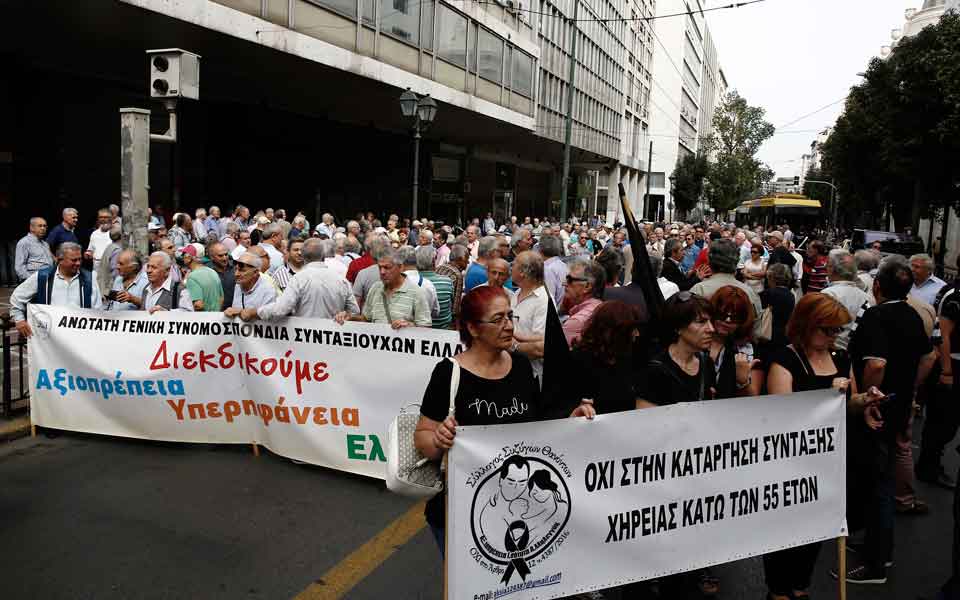End of bailout means fresh reductions

Millions of salaried workers and pensioners stand to lose at least one monthly payment within two years, in 2019 and 2020. For Greece to boast of a successful – as the government desires – exit from the third bailout program without facing any obstacles by August, the Finance Ministry has ruled out the option of avoiding a reduction to pensions from 2019 and will also be proceeding with demands to reduce the minimum tax threshold as of 2020.
Official confirmation of the program’s implementation has put an end to speculation that the government may scrap plans to reduce pensions further, even though several officials repeatedly suggested in the last few weeks that the cuts would not be necessary. At the same time, of course, the cost of the bill footed by millions of low-income workers and pensioners just keeps growing.
On the issue of pension cuts in particular, confirmation that the agreed program would be adhered to in full came just as the Council of State is expected to rule on whether cuts to new pensions and the reduction of old ones to current levels are constitutional. And while leaks suggesting that the reductions would be found in accordance with the constitution have reduced some of the pressure on the government concerning what is one of its most unpopular laws – and resulting in the resignation of the head of the country’s highest administrative court – it has also deprived the Finance Ministry of an argument for supporting its case against proceeding with the cuts.
Greeks will find out the end result at the bank, when they see their balance lower than expected, as the Labor Ministry is eager to avoid there being signs in this summer’s pension clearance of the so-called personal difference (between pensions issued before and after 2016, with some exceptions), which is an indication of the reduction that should be expected as of next year.
January 2019 is when the barrage of cuts to pensions is due to start, lasting at least until 2022, with reductions to main as well as auxiliary pensions and also the abolition of family benefits.
The bulk of cuts will affect some 1.1 million retirees, who will see their main pension slashed as of this December (when the January 2019 pensions are paid out) by up to 18 percent, through the partial or complete reduction of the personal difference.
In total, in the private and public sector, the reduction of pension expenditure from this particular measure in 2019 is estimated at 2.13 billion euros. Reductions will start at 5 euros a month and may reach up to 350 euros a month. There will even be cuts to pensions where there is no personal difference, owing to the abolition of family benefits currently being paid out with the pensions in the public and private sectors. This is expected to concern around 1 million pensioners. Some 200,000 pensioners will also be affected by the cut of the personal difference from auxiliary pensions. According to the midterm fiscal plan, the reduction in 2019 will amount to savings of 232 million euros for state coffers, which is the amount pensioners will also be deprived of.
According to the government’s plans, the sum of cuts that will become evident as of this December will mean that new pensions will eventually be 30 percent below the original level before the law introduced in May 2016 by then labor minister Giorgos Katrougalos. Therefore, the vast majority of monthly pensions will hover in the 700-euro range, even for retirees who used to bring in an average of 1,300 euros.
Furthermore, pensions will remain frozen for all pensioners at least until December 31, 2022. This measure by itself will save the state 128 million euros, while by the end of that period the reduction of pension expenditures will come up to 750 million euros.
Similarly in the case of the reduction to the tax-free threshold that will slash the income tax discount, the public relations strategy of advertising the avoidance of bringing it forward to 2019 as a concession by the International Monetary Fund will not only put off social discontent, but actually exacerbate it. That is so because in 2020, for the first time, some 1 million taxpayers whose incomes currently stand below the tax-free threshold will have to pay an annual tax of 650 euros, while pensioners with monthly incomes of 500-600 euros will lose an entire month’s pension just because of the new, tough taxation.
Still, as one senior government official said, the measures will be applied along with the so-called counter-measures, also known as “good measures.” However, according to measures that have already been voted through, taxpayers with annual incomes of up to 25,000 euros are not going to feel any less pressure, even with the application of the counter-measures. It is only those earning more than 25,000 euros per year who can look forward their tax load being somewhat reduced one the economy starts meeting its targets so that the counter-measures can start applying. This will be achieved thanks to the drop of the lowest income tax rate from 22 percent to 20 percent and the new, more favorable bracket rates for calculating the solidarity levy.
Therefore, government rhetoric will revert to the “fiscally neutral result,” though in practical terms this will not mean that for every euro that comes out of the pocket of salaried workers and pensioners, another will go in.
The government will also try to manage the reduction of pensions through the rent subsidy. Its strategy will focus on the fact that 550,000 households will receive a monthly handout of up to 1,000 euros that can even be used for the repayment of their mortgage. This measure will by no means cover the losses, as it will not be handed out to the pensioners – though not to all of them – who will be bearing the brunt of the cuts.





